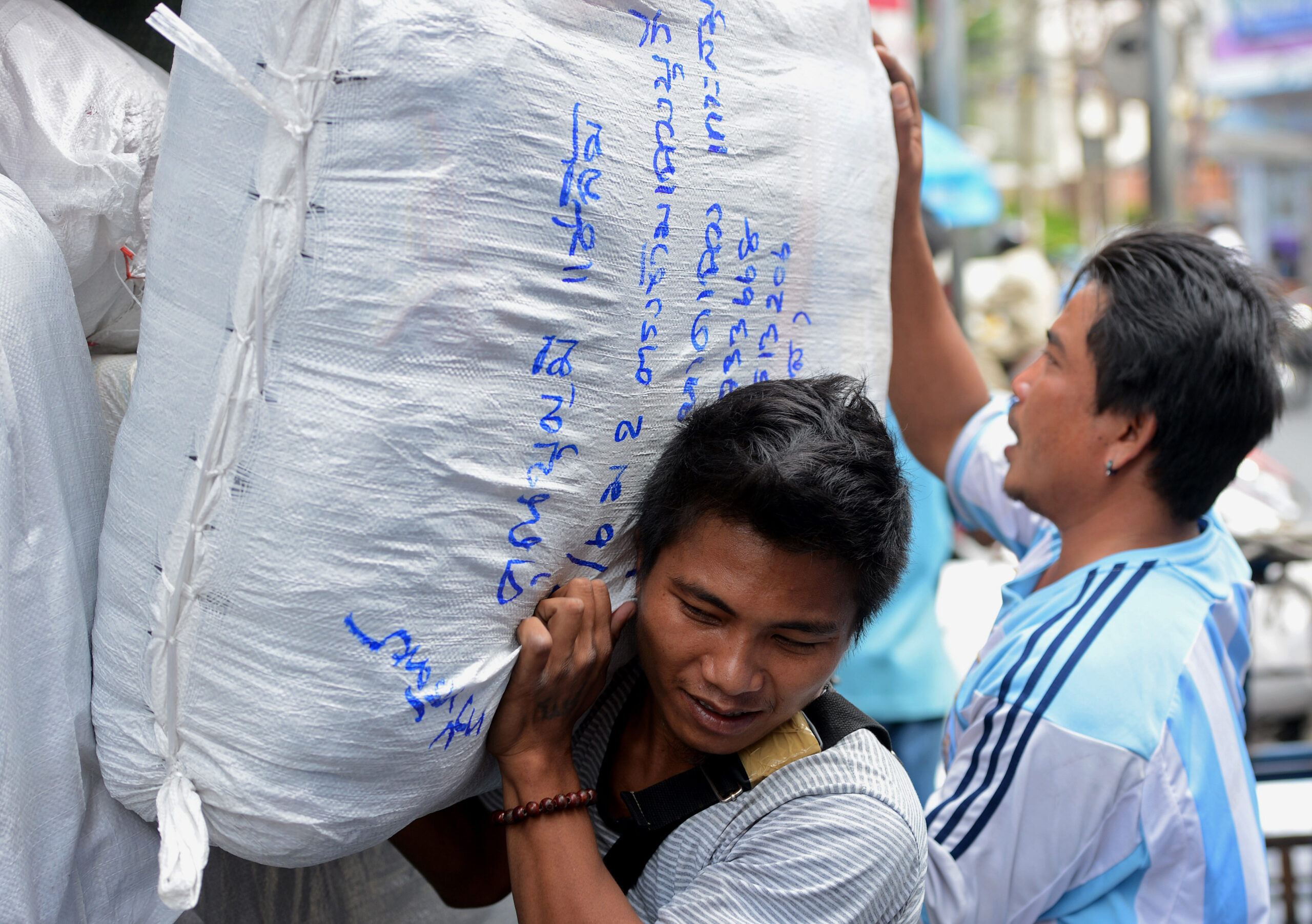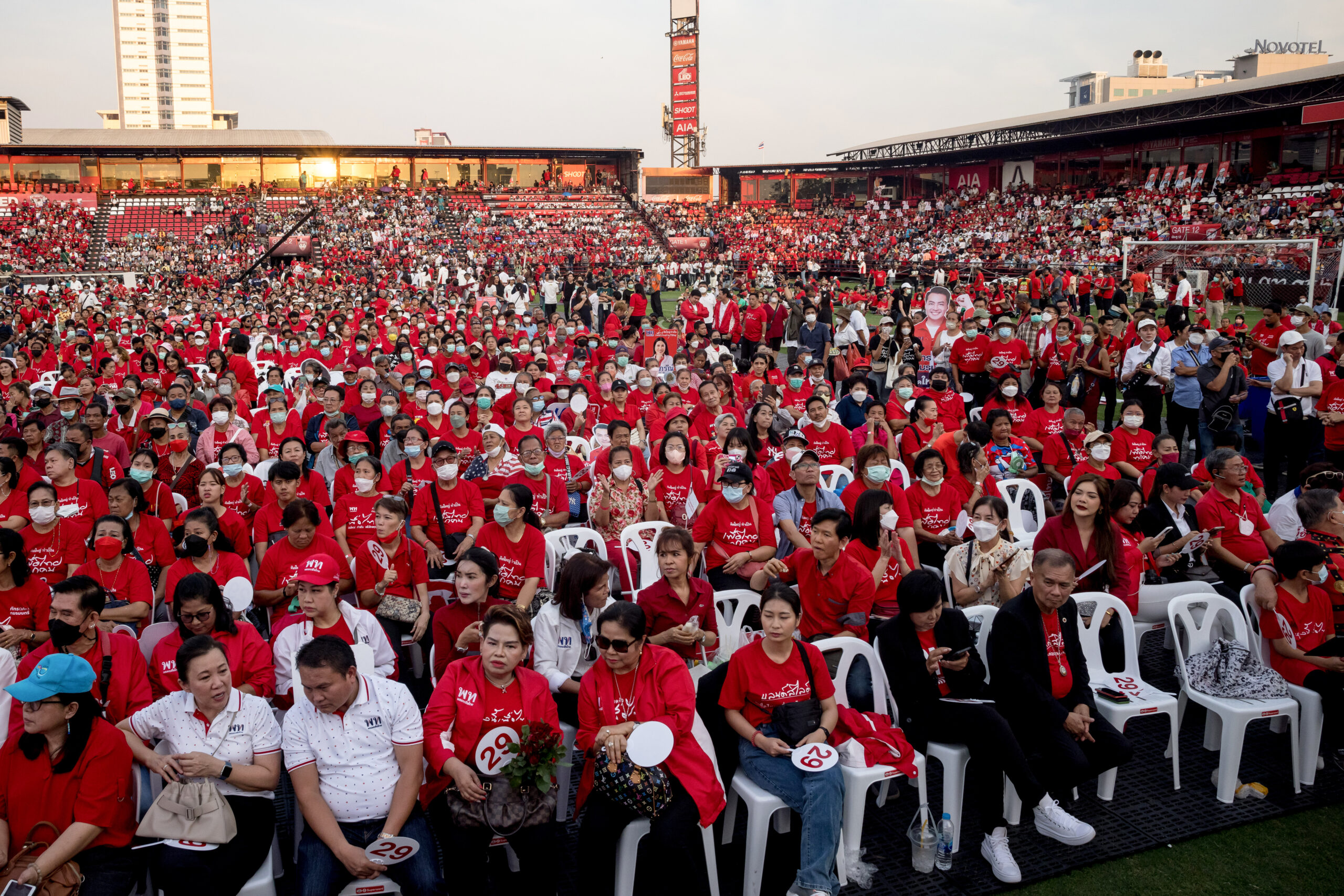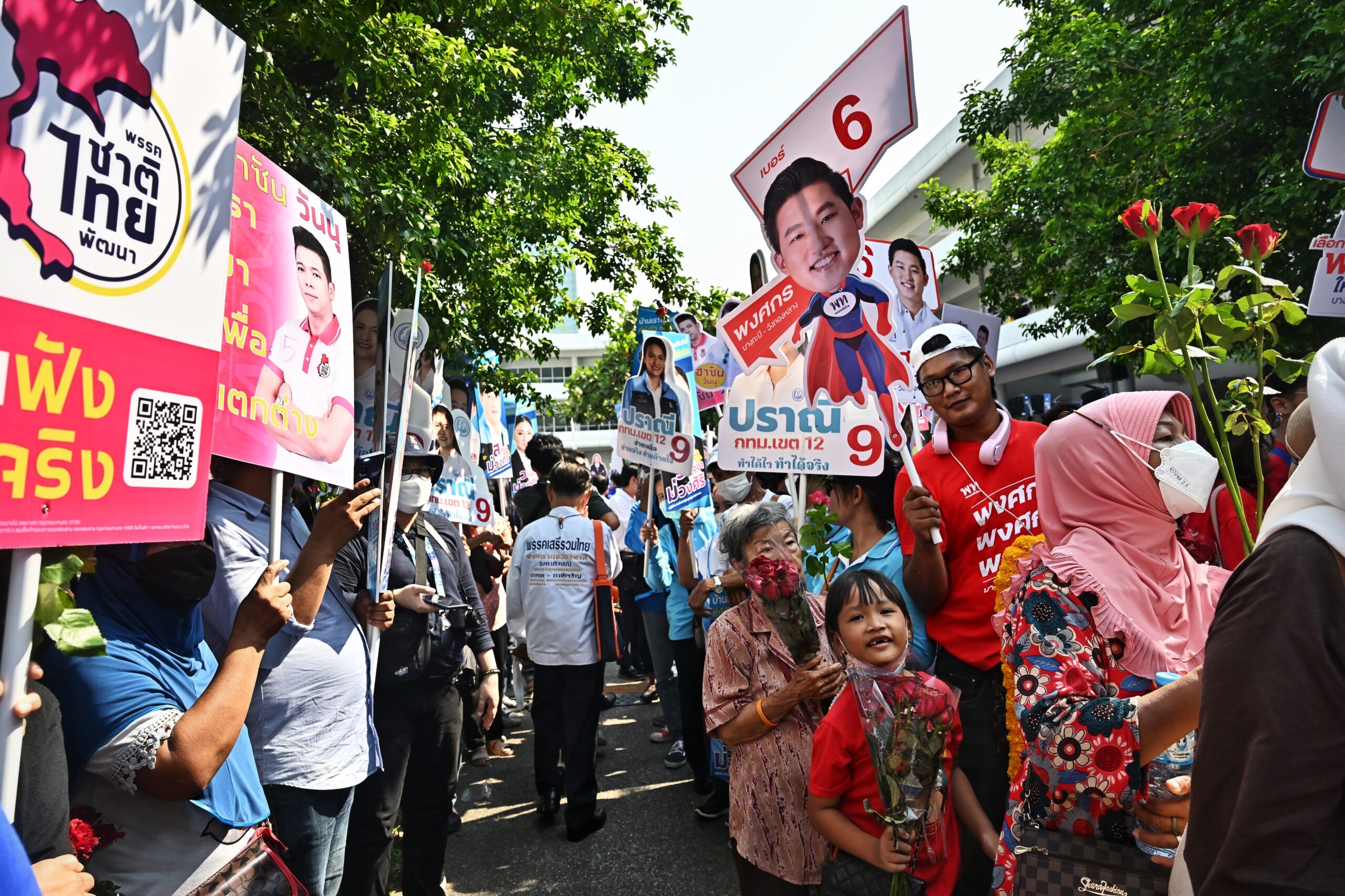Bangkok’s busy streets are even more crowded than usual ahead of the general election on 14 May.
Grinning faces of political candidates look down from signs along the roadways, complete with their election numbers as they will appear on the ballot.
The media landscape is also crowded, with news programs such as Channel 3 and Matichon hosting forums and interviews with candidates. Online campaigns are sharing colourful infographics with simple breakdowns of the parties’ unprecedented economic promises, including a doubling of the minimum wage and major cash handouts for new parents.
But Thanaphat Sinwilai, a 22-year-old from Sing Buri who is currently working in Bangkok, is not swayed by the rhetoric, taking it for just empty political talk. He’s heard a lot about the different campaigns, especially about the minimum wage increase.
“They all say it but not everyone will do it,” he said. “They’re going to attract the poor so they will listen to you, give them hope but not do anything.”
Parties have pledged upwards of $90 billion in total offerings in the run-up to next month’s election, as reported by the Thailand Development Research Institute.
The different parties are offering a range of programmes and handouts, but all are competing with the common goal of winning votes.
The opposition Pheu Thai Party, whose last turn as a ruling party was toppled in the 2014 military coup orchestrated by current Prime Minister Prayuth Chan-o-cha, has unveiled some of the largest proposals.
Besides calling for a doubling of the daily minimum wage, from about $9 to $17.50 (around 300 to 600 baht), the party announced a first in Thai political promises: a one-time transfer of $300 in digital currency to be sent to everyone 16 and up.
Meanwhile, the progressive opposition Move Forward Party is offering a 50% increase in the daily minimum wage along with a monthly allowance of almost $90 for disabled people.
Not to be outdone, Prayuth’s new United Thai Nation Party, plans to triple cash handouts for some welfare cardholders to about $30 a month. Prayuth announced his switch to United Thai Nation from the ruling Palang Pracharat Party late last year.
Thailand’s pandemic recovery has been one of the weakest in the region, with GDP growing only 2.6% in 2022 compared to Malaysia’s 8.7% growth.
Voters and politicians have money on the mind, but whether these promises can realistically be carried out remains uncertain. Aggressive government spending plans also come with economic consequences that some experts say aren’t necessarily positive.

The economic impact of expensive policies
The most obvious benefit of these political handouts for Thai citizens is the stronger social safety net they would gain, particularly for targeted vulnerable populations such as older people, new parents and low-income families.
“These populist policies, it’s not a bad thing in itself,” said Boonwara Sumano, senior research fellow at the Thailand Development Research Institute. “But without some development in the fundamental engine of economic growth, like the capacity of the people, new skills in this disruptive world, we don’t see the long-term growth in Thailand happening.”
Part of the concern is that, while minimum-wage employees would benefit from higher wages, only highly profitable, large businesses could easily afford to pay employees at a much higher rate. Minimum wage requirements do not apply to all employees, and are not always enforced by the government.
“We also have to look at small businesses as well because we want to improve small and medium businesses. I don’t think it is easy for them to afford this [minimum wage],” said Titipol Phakdeewanich, dean of the Faculty of Political Science at Ubon Ratchathani University in Thailand. “We can’t just rely on big businesses that can afford to do that.”
Another question from analysts is how all of these plans will be paid for. Move Forward has proposed cutting military spending to fund an increase in pension payments. But many parties have not clearly outlined specifics about how they intend to fund new welfare programmes, such as what current public resources would need to be reallocated.
If carried out, Thai campaign promises could increase the country’s public debt, which is already about 60% of GDP.
“I don’t see other alternatives apart from borrowing more from outside the country,” said Titipol. “And that would actually cause a problem to the economy in the long term.”
The consequences of empty promises
The total campaign promises coming from nine major campaigns would require nearly doubling government spending, according to the Thailand Development Research Institute.
Welfare programs for the elderly, which have been proposed by parties including Palang Pracharath and Move Forward, could require $14.5 billion in additional spending.
As the parties are competing for numbers of seats in parliament, multiple parties can end up having representation. But a coalition government will not mean all the parties have equal power. Each party might have control over two or three ministries, but that means none will be able to deliver the promises they made while campaigning.
“Parties make promises like, ‘Oh, we’re going to offer price guarantees for certain agricultural products,’” said Napon Jatusripitak, visiting research fellow at ISEAS-Yusof Ishak Institute. “But if you don’t end up controlling the Ministry of Agriculture and other parties do, there’s no way it’s going to work.”
Empty political promises could further erode voters’ trust in the government, which was already harmed after the 2014 military coup. While older voters might be used to unfulfilled campaign statements, younger voters are at risk of being disillusioned for the first time.
Thai election law stipulates that campaigns must disclose details on how policies will be funded and carried out, but these laws are rarely enforced.
“More transparency and more accountability from political parties would be very beneficial to Thai democracy because these two things have been missing from the past,” Boonwara said.
“That’s why democracy in Thailand has been so fragile because political parties have no consequence for not following [through on] their promises and nothing has been communicated to the public about why these policies have not happened.”

Will the tactic actually attract voters?
Despite the potential consequences of whether the promises are carried out, some analysts see these offerings as a gamble that won’t pay off.
“[Monetary promises] are not the main influence on voting decisions,” said Titipol. “It is only part of decision making, but it is not a decisive thing that will dictate electoral results.”
He said rural voters in particular have often been characterised simplistically by the middle class as casting votes based on government handouts. Instead, he sees rural voters as influenced both by concrete economic benefits as well as broader party platforms such as anti-drug proposals. Such voters also may take into account what candidates will do for their local area.
“The majority of voters in Thailand who are outside the urban centres, they actually consider other criteria besides national policies: what candidates are offering in their specific constituencies,” said Napon, including development projects bringing better infrastructure for water and electricity to their villages and subdistricts.
“Those are the things that usually matter quite heavily when making voting choices,” for the rural poor, while urban-dwellers and the Thai elite already have access to basic amenities.
As someone who has straddled both worlds, growing up in a rural province but recently pursuing his bachelor’s degree in engineering in Bangkok, young voter Thanaphat agrees that location plays an important role for residents in rural areas. He has seen voters in his hometown influenced by how politicians treat a specific area or village.
As he approaches only his second time voting, he’s not holding his breath waiting for what politicians have promised during their campaigns.
“It’s going to be a shit show, and everyone knows what’s going to happen,” Thanaphat said. “Those who hope, then will have to continue to hope again, but [the promises] will not come true.”


